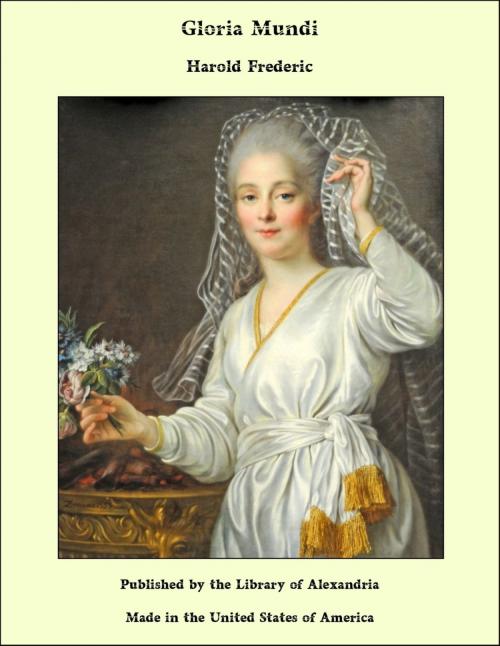| Author: | Harold Frederic | ISBN: | 9781465627575 |
| Publisher: | Library of Alexandria | Publication: | March 8, 2015 |
| Imprint: | Language: | English |
| Author: | Harold Frederic |
| ISBN: | 9781465627575 |
| Publisher: | Library of Alexandria |
| Publication: | March 8, 2015 |
| Imprint: | |
| Language: | English |
The meeting of the man and the woman—it is to this that every story in the world goes back for its beginning. At noon on a day late in September the express train from Paris rested, panting and impatient, on its brief halt in the station at Rouen. The platform was covered with groups of passengers, pushing their way into or out of the throng about the victualer’s table. Through the press passed waiters, bearing above their heads trays with cups of tea and plates of food. People were climbing the high steps to the carriages, or beckoning to others from the open windows of compartments. Four minutes of the allotted five had passed. The warning cries of the guards had begun, and there was even to be heard the ominous preliminary tooting of a horn. At the front of the section of first-class carriages a young woman leaned through the broad window-frame of a coupé, and held a difficult conversation with one of the waiters. She had sandwiches in one hand, some loose coin in the other. Her task was to get at the meaning of a man who spoke of sous while she was thinking in centimes, and she smiled a little in amused vexation with herself at the embarrassment. “Deux sandwich: combien si vous plait, monsieur?” she repeated, with an appealing stress of courtesy. More slowly she constructed a second sentence: “Est un franc assez?” She proffered the silver coin to help out her inquiry, and the waiter, nodding, put up his hand for it. On the instant, as the noise of slamming doors and the chorus of “Au coupé, s’il-v’-plait!” grew peremptory, one in authority pushed the waiter aside and pulled open the coupé door upon which she had been leaning. “Permettez moi, madame!” he said curtly. Close at his back was a young man, with wraps upon his arm and a traveling bag in his hand, who was flushed and breathing hard with the excitement of hurry, and who drew a long sigh of relief as he put his foot on the bottom step of the coupé. The young woman had grasped the door and was striving stoutly to drag it to her. “Mais non, monsieur!” she shouted, her voice quivering with vehemence. “Cette compartement est tout reserveé-engageé! J’ai donné sank franc soisante, en Paris, pour moi seulement! Je proteste!” Sharp blasts from a horn at the rear of the train broke in upon her earnest if uncertain remarks. The official held up one warning hand, while with the other he wrenched the door wide open. He said something of which the girl comprehended only its arbitrary harshness of spirit. Brusquely thrusting a ticket into the young man’s hand, he pushed him up the steps into the compartment, and closed the door upon him with a clang. Arms were waving outside; the tin horn screamed; a throb of reawakened energy thrilled backward through the train.
The meeting of the man and the woman—it is to this that every story in the world goes back for its beginning. At noon on a day late in September the express train from Paris rested, panting and impatient, on its brief halt in the station at Rouen. The platform was covered with groups of passengers, pushing their way into or out of the throng about the victualer’s table. Through the press passed waiters, bearing above their heads trays with cups of tea and plates of food. People were climbing the high steps to the carriages, or beckoning to others from the open windows of compartments. Four minutes of the allotted five had passed. The warning cries of the guards had begun, and there was even to be heard the ominous preliminary tooting of a horn. At the front of the section of first-class carriages a young woman leaned through the broad window-frame of a coupé, and held a difficult conversation with one of the waiters. She had sandwiches in one hand, some loose coin in the other. Her task was to get at the meaning of a man who spoke of sous while she was thinking in centimes, and she smiled a little in amused vexation with herself at the embarrassment. “Deux sandwich: combien si vous plait, monsieur?” she repeated, with an appealing stress of courtesy. More slowly she constructed a second sentence: “Est un franc assez?” She proffered the silver coin to help out her inquiry, and the waiter, nodding, put up his hand for it. On the instant, as the noise of slamming doors and the chorus of “Au coupé, s’il-v’-plait!” grew peremptory, one in authority pushed the waiter aside and pulled open the coupé door upon which she had been leaning. “Permettez moi, madame!” he said curtly. Close at his back was a young man, with wraps upon his arm and a traveling bag in his hand, who was flushed and breathing hard with the excitement of hurry, and who drew a long sigh of relief as he put his foot on the bottom step of the coupé. The young woman had grasped the door and was striving stoutly to drag it to her. “Mais non, monsieur!” she shouted, her voice quivering with vehemence. “Cette compartement est tout reserveé-engageé! J’ai donné sank franc soisante, en Paris, pour moi seulement! Je proteste!” Sharp blasts from a horn at the rear of the train broke in upon her earnest if uncertain remarks. The official held up one warning hand, while with the other he wrenched the door wide open. He said something of which the girl comprehended only its arbitrary harshness of spirit. Brusquely thrusting a ticket into the young man’s hand, he pushed him up the steps into the compartment, and closed the door upon him with a clang. Arms were waving outside; the tin horn screamed; a throb of reawakened energy thrilled backward through the train.















